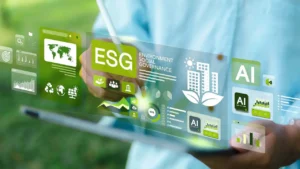
What’s New with I-RECs in 2026: What Businesses Need to Know Now?
For businesses in the UAE, particularly those with international supply chains, export exposure, or ESG-linked financing, the I-REC landscape in 2026

In today’s rapidly evolving world, technology is not only transforming industries but also reshaping how businesses approach sustainability. As environmental, social, and governance (ESG) criteria take center stage in global business operations, the role of sustainable innovation in technology has never been more critical. From Artificial Intelligence (AI) to the Internet of Things (IoT), cutting-edge technologies are driving the future of sustainability.
At IFRSLAB, we are at the forefront of helping businesses leverage these innovations to meet their sustainability goals. In this blog, we’ll dive into some of the most promising sustainable tech innovations and explore how businesses can implement them to reduce their environmental impact, streamline operations, and stay competitive in a greener world.
Sustainability is no longer an optional add-on for businesses. Companies are under increasing pressure from stakeholders—investors, regulators, and customers alike—to demonstrate their commitment to environmental and social responsibility. With this growing emphasis on ESG, companies need to adopt technologies that not only optimize their operations but also contribute to sustainability goals.
That’s where sustainable technology comes in. Technologies like AI, IoT, and blockchain are no longer just about efficiency or cost-saving; they are now essential tools for reducing carbon footprints, improving resource management, and creating sustainable business models.
Why this matters: Sustainable technology is not just a trend. It’s a critical component of long-term business strategy. By integrating these innovations, businesses can future-proof themselves against regulatory changes, reduce costs through greater efficiency, and build stronger relationships with sustainability-minded stakeholders.
Artificial Intelligence (AI) has the potential to significantly enhance business sustainability efforts. Through the power of machine learning and data analytics, AI can help businesses identify inefficiencies, predict future resource needs, and optimize supply chains to reduce waste.
Here are some key ways AI is driving sustainable innovation:
The Internet of Things (IoT) refers to the interconnected network of devices that communicate with each other to collect and share data. In the context of sustainability, IoT offers tremendous potential for improving operational efficiency and reducing environmental impact.
Here’s how IoT is driving sustainable innovation:
Although blockchain is often associated with cryptocurrencies, it has a much broader application, particularly when it comes to sustainability. Blockchain technology can provide the transparency and accountability needed to meet ESG goals.
While sustainable technologies like AI, IoT, and blockchain offer significant benefits, many businesses struggle to implement them effectively. Common challenges include the high cost of technology adoption, data security concerns, and a lack of technical expertise.
At IFRSLAB, we provide end-to-end support for businesses looking to implement sustainable technologies. From assessing your company’s unique needs to designing tailored solutions and providing ongoing support, we make the transition to sustainable tech seamless and effective.
We also help businesses navigate regulatory requirements, ensuring that all technology implementations meet local and global ESG standards. With our comprehensive ESG advisory services, we help companies not only adopt sustainable technologies but also integrate them into a broader sustainability strategy.
Sustainable innovation in technology is no longer just a futuristic concept—it’s a reality that is transforming how businesses operate. AI, IoT, and blockchain are playing a critical role in helping companies reduce their environmental impact, improve efficiency, and meet the growing demands of sustainability-conscious stakeholders.
At IFRSLAB, we are committed to helping businesses embrace these technologies as part of their broader ESG strategy. By integrating AI, IoT, and blockchain into your operations, you can future-proof your business, drive long-term growth, and contribute to a more sustainable world.
Ready to take your sustainability efforts to the next level? Contact IFRSLAB today to learn how we can help you implement the latest sustainable technologies and achieve your ESG goals.

For businesses in the UAE, particularly those with international supply chains, export exposure, or ESG-linked financing, the I-REC landscape in 2026

Below in this article, we have outlined five critical UAE tax rule updates for 2026, explains their practical impact, and sets out how businesses should prepare strategically, not reactively.

For many organisations, ESG reporting has long been perceived as a future problem. Something relevant to large multinationals, public companies, or heavily regulated sectors. That assumption is no longer valid.
UAE : (+971) 52 710 0320 PAK : (+92) 300 2205746 UK : (+44) 786 501 4445
Office 2102 Al Saqr Business Tower 1, Sheikh Zayed Road
S-25, Sea Breeze Plaza Shahrah-e-Faisal, Karachi
Office#1304, 13th Floor, Al Hafeez Heights, Gulberg III
P.O. Box 71, P.C. 100, Muscat
104 Broughton Lane Salford M6 6FL,
UAE : (+971) 52 710 0320 PAK : (+92) 300 2205746 UK : (+44) 786 501 4445
Office 2102 Al Saqr Business Tower 1, Sheikh Zayed Road
S-25, Sea Breeze Plaza Shahrah-e-Faisal, Karachi
Office#1304, 13th Floor, Al Hafeez Heights, Gulberg III
104 Broughton Lane Salford M6 6FL
P.O. Box 71, P.C. 100, Muscat
Typically replies within a day